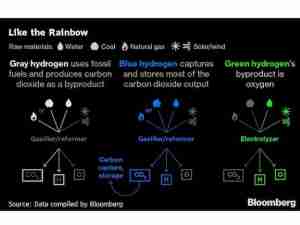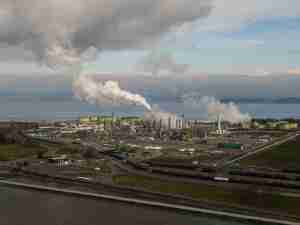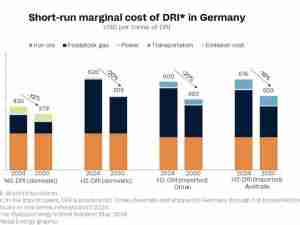Fuel shortages are spreading across the U.S. East as panicked motorists top up their tanks five days after hackers knocked out the nation’s biggest gasoline pipeline.
At least three distribution hubs in Pennsylvania have run dry and long lines of tanker trucks are forming at terminals in New Jersey due to the Colonial Pipeline outage. Meanwhile, more than three-quarters of filling stations in some cities in South Carolina, North Carolina and Florida are without gasoline. And in the Washington, D.C., metro area, cars are queuing along roads as they wait to to enter stations.
U.S. average fuel prices topped $3 a gallon for the first time in more than six years and the premium for wholesale gasoline in the New York area reached its widest in three months. The gains may add to broader inflationary pressures as commodity prices from timber to copper also surge.

Colonial’s system shut May 7. The pipeline’s operating company said it expects to make a decision Wednesday on whether it’s time to begin the process of restarting its network of pipelines that transport gasoline, diesel and jet fuel from the Houston area to North Carolina and up the East Coast.
The White House has so far announced several measures to blunt the growing crisis, including fuel waivers and additional weight limits for some trucks. It is also taking initial steps that could permit foreign tankers to transport gasoline and diesel to East Coast ports.
“Colonial has announced that they’re working toward full restoration by the end of this week, but we are not taking any chances,” Transportation Secretary Pete Buttigieg said at a daily White House briefing on Wednesday. “Our top priority now is getting fuel to communities that need it, and we will continue doing everything that we can to meet that goal in the coming days.”
The Biden administration will also give a House briefing on the cyberattack at 6 p.m. Washington time.
Colonial has only managed to restart a small segment of the pipeline as a stopgap measure. Even when the pipeline is restored to full service, it will take about two weeks for gasoline stored in Houston to reach East Coast filling stations, according to the most recent schedule sent to shippers. For diesel and jet fuel, the transit time is even longer—about 19 days—because they are heavier and move more slowly.
Colonial connects Gulf Coast refineries to population centers from Atlanta to New York and beyond. Each day, it normally ships about 2.5 million barrels (105 million gallons), an amount that exceeds the entire oil consumption of Germany.
As the outage drags on, traders are booking larger vessels that can send more fuel from the Middle East and Asia west to destinations such as the U.S. East Coast, according to shipbrokers and fixtures data compiled by Bloomberg.
Two of the nation’s largest truck-stop owners—- Love’s Travel Stops & Country Stores Inc. and TravelCenters of America Inc.—confirmed that fuel is scarce in some states. Both companies said they’re taking extraordinary measures to replenish tanks.
The Biden administration issued an order on Sunday extending the amount of time truck drivers can spend behind the wheel when transporting fuel across 17 states and the District of Columbia. On Tuesday evening, the Transportation Department said 10 states could allow heavier-than-normal truck loads of gasoline and other fuels.
Federal transportation regulators also took the first step toward waiving the 101-year-old Jones Act that prohibits foreign-flagged and -staffed ships from hauling products from one U.S. port to another.
”The Department of Homeland Security is standing ready to review any requests for a temporary waiver of the Jones Act from companies that demonstrate that there’s not sufficient capacity on Jones Act-qualified vessels to carry specific shipments of fuel in and around the region,” Buttigieg said on Wednesday. He declined to speak to “any specific waiver requests going on right now.”
Meanwhile, most Gulf Coast refineries are expected to trim output amid expectations that supplies will begin backing up in the nation’s oil-refining nexus. Much of the cuts may be shouldered by refineries from Port Arthur, Texas, and eastward. At least one refinery each in Texas and Louisiana already reduced production.
The Environmental Protection Agency moved to allow the sale of gasoline that doesn’t satisfy requirements meant to help combat smog in certain areas. An initial order allowed the sale of conventional gasoline in areas where reformulated gasoline is required across Maryland, Pennsylvania, Virginia and the District of Columbia. A second order went further by waiving low-volatility requirements governing conventional and reformulated gasoline in those areas, as well as nine other states.
Gasoline isn’t the only oil-derived product under threat. In an effort to bolster jet-fuel inventories, Southwest Airlines Co. has begun flying supplies to Nashville, Tennessee, and other cities. So far, no Southwest flights have been affected by the pipeline closure; rather, the airline said it’s “actively managing” fuel stockpiles. United Airlines Holdings Inc. loaded extra fuel on flights to preserve local supplies in places like Baltimore and Greenville-Spartanburg, South Carolina.







_-_28de80_-_58820516bd428ab3fd376933932d068c43db9a4a_lqip.jpg)



